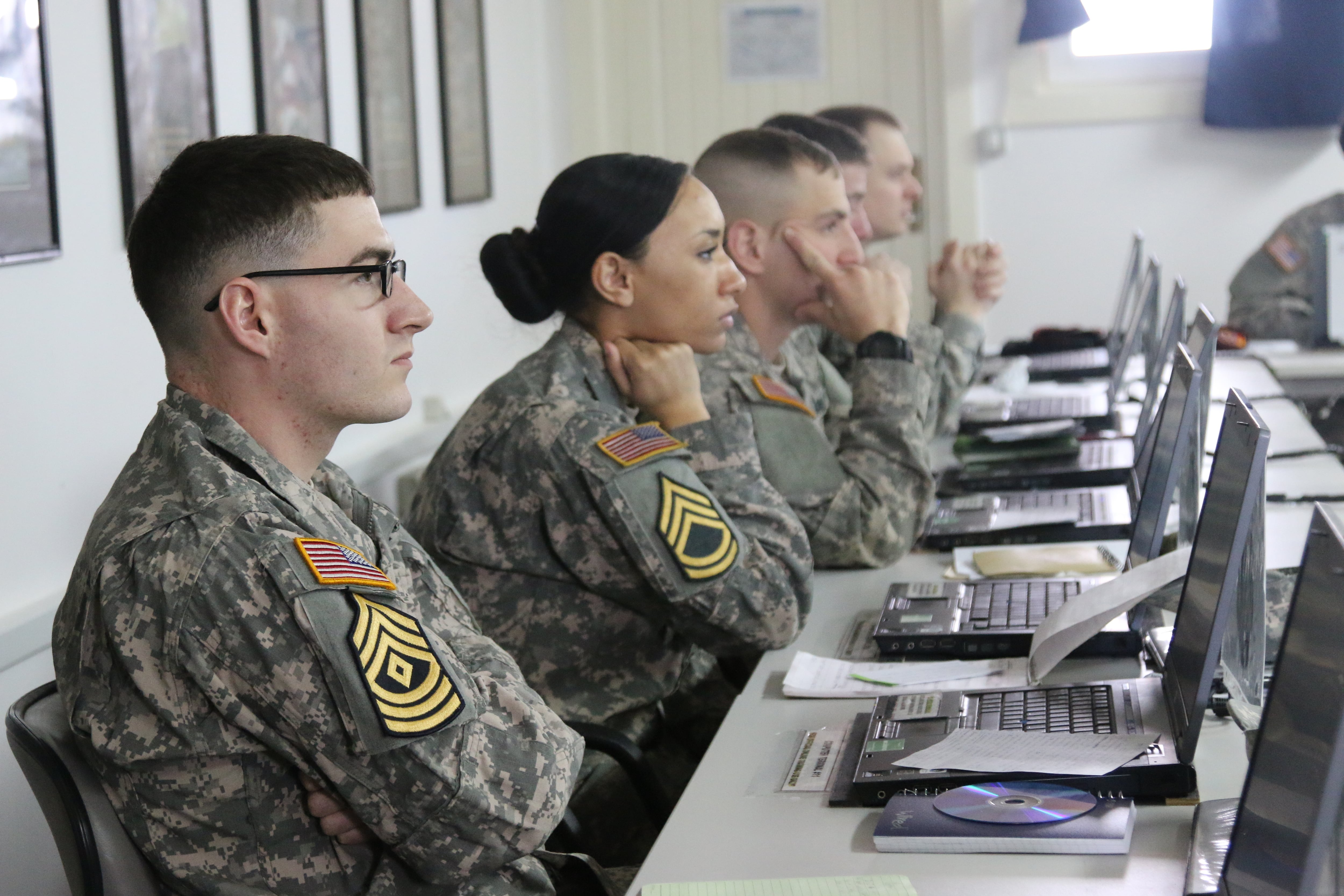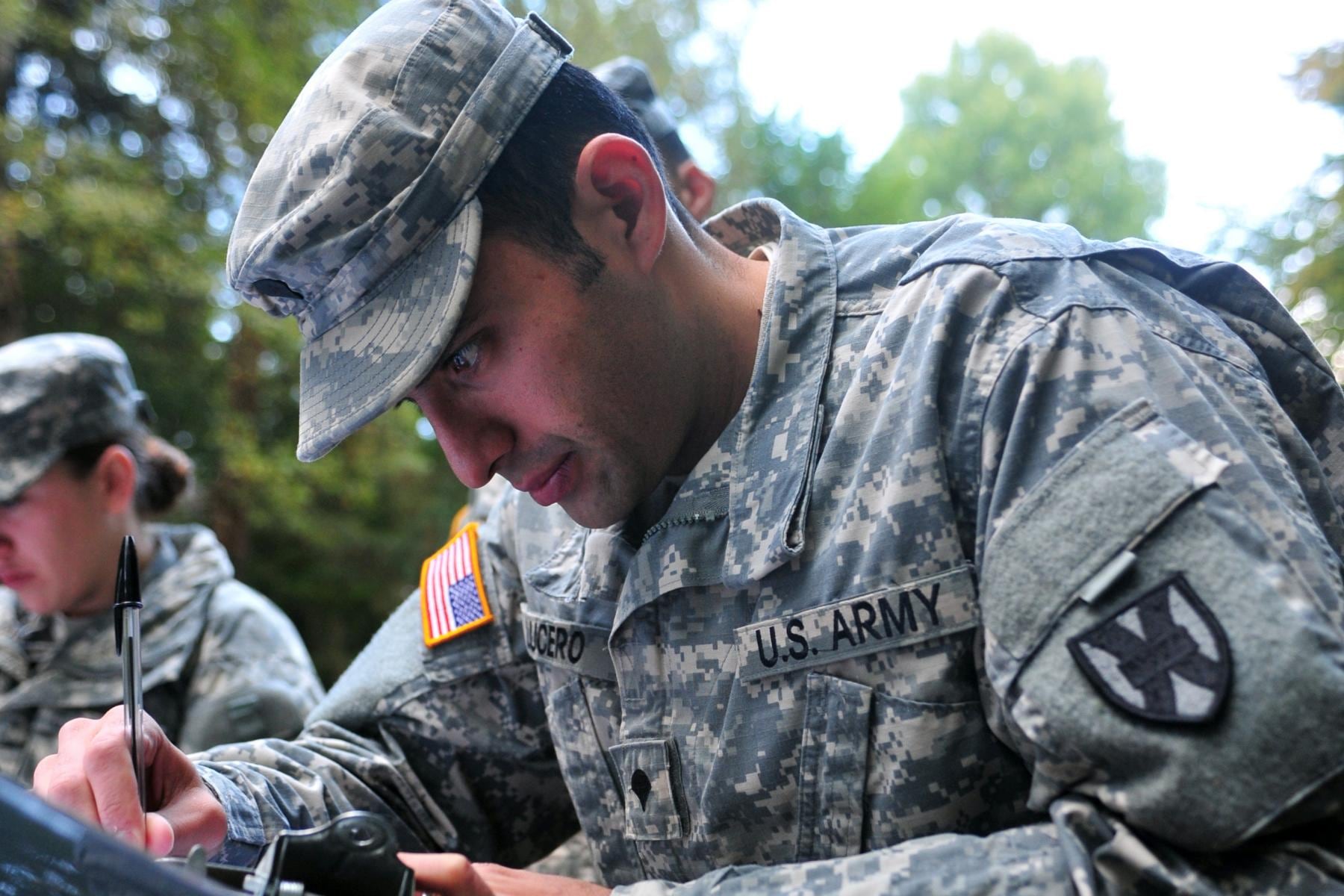The Army is chipping away at a backlog of nearly 14,000 soldiers who have not completed the schools they need to be considered for promotion.
About 2,280 soldiers from that group went to school during the first quarter of fiscal 2016, or October through December, said Command Sgt. Maj. David Davenport, the senior enlisted soldier for Training and Doctrine Command. That leaves about 12,000 to go.
"It's a small reduction, but, more importantly, the message is getting out that STEP is important, and if you want to get promoted, you've got to get to school," he said.
STEP, or "select, train, educate, promote," is a new strategy that requires soldiers to have the right level of professional military education before they can be promoted to the next rank.
STEP went into effect Jan. 1 for soldiers seeking promotion to sergeant and staff sergeant. It becomes mandatory for promotion to sergeant first class later this year and for promotion to master sergeant in 2017.
The backlog is not because of increased demand for school. In fact, officials say there are classroom seats not getting filled. The problem is at the unit level, where some soldiers have avoided school for several years, and their commands supported it by continually granting waivers.
Under STEP, soldiers who don't go to school can't get promoted, which could lead to them being kicked out of the Army. Before STEP, soldiers typically went to school after they were promoted.
Many soldiers also were promoted while deployed to Iraq or Afghanistan and simply did not have time between back to back deployments to go to school. Still others, according to sources, are not high-speed performers who have worked to keep their career and professional development on track.
Davenport, who spoke Wednesday to reporters, said he's most concerned about soldiers who have been in grade three or more years. About 4,000 of the 14,000 soldiers in the backlog are in that category, he said.
Within that population, about 1,200 had deferred "six or more times" from attending school, Davenport said.
"That was the genesis of needing STEP," Davenport said, "to get our NCOs into the academic environment to receive formal professional military education, to ensure they are certified in their core competencies."

The Army could increase the frequency of PME courses offered for soldiers in low-density MOSs.
Photo Credit: Sgt. Melissa Parrish/Army
As TRADOC works to get soldiers to school, it is first targeting soldiers who are affected by STEP and risk not being promoted because they haven't been to school. Soldiers in the backlog are the second priority, and those who need to go to school early because of an upcoming deployment or training event or regionally-aligned force mission are the third priority, Davenport said.
To tackle the backlog, Human Resources Command is scheduling everyone in the backlog who needs the Advanced Leader Course and Senior Leader Course against a school date. The Basic Leader Course (formerly the Warrior Leader Course) is a local school.
STEP, because it is new, is probably the topic soldiers bring up to him most often, Davenport said.
"There are a lot of misconceptions out there about STEP," he said.
Many soldiers think TRADOC doesn't have the capacity to get soldiers to school. That's simply not true, Davenport said.
"What I've been asking the force is to make sure they're ready to go to school," he said. "Be physically fit, have all their items ready to go."
In addition to STEP, Davenport discussed a number of other emerging TRADOC initiatives with reporters. Here are some highlights.
Master Leader Course.
This new course, for sergeants first class who are being promoted to master sergeant, will become a program of record for the Army in fiscal 2017, Davenport said.
The Army has conducted two pilot courses and a third is scheduled for March.
"We've gotten great feedback," Davenport said. "The soldiers like the rigor behind it."
The biggest misconception about the Master Leader Course likely is that it's similar to the old First Sergeants Course the Army ran at Fort Bliss, Texas, Davenport said.
"It's much more than that," he said. "We're helping them to transition from the tactical level to the operational level."
New NCOER.
The Army on Jan. 1 launched its new NCO Evaluation Report. It is sharply different from enlisted rating systems of the past, and it aims to fix ratings inflation.

An NCOER Counseling and Support Form.
Photo Credit: Sgt. 1st Class Mark Bell/Army
Under the new system, senior raters can only give 24 percent of their NCOs a top, or "Most Qualified," rating.
In the past, any soldier who received a 2-block or "Highly Qualified" rating would practically be guaranteed a non-selection for promotion. Now, under the new system, a 2-block rating is the standard.
The new NCO rating system also introduces separate report forms for soldiers of different ranks and new responsibilities for raters and senior raters.
It's too soon to say if there are any issues with the new NCOER, Davenport said, adding that he is looking forward to feedback from the upcoming E-7 promotion board, which will be the first to look at the new NCOER.
The key for now is to convey to the force why the NCOER had to be changed, Davenport said.
"I think we need to do a better job of explaining why we needed this change, how inflated the old system had become," he said. "We're really trying to affect a massive change, so it's important that we talk to our soldiers, that they understand the direction we're heading, and so they understand why we're doing it."
Army-wide town hall.
TRADOC will host its very first "State of NCO Development Town Hall" from 5-7 p.m. Eastern on March 3, Davenport said.
During the two-hour event, Davenport and experts from the Institute of Noncommissioned Officer Professional Development will take soldier questions.
To participate, soldiers can post their questions on social media using the hashtag #talk2TRADOC. They also can post video questions using the same hashtag.
On March 3, go to www.tradoc.army.mil/watch to watch the live video feed of the town hall. Soldiers can also ask questions during the live stream by signing in to the discussion box on the video feed.
For more, visit Davenport's official blog at here.
Michelle Tan is the editor of Army Times and Air Force Times. She has covered the military for Military Times since 2005, and has embedded with U.S. troops in Iraq, Afghanistan, Kuwait, Haiti, Gabon and the Horn of Africa.





